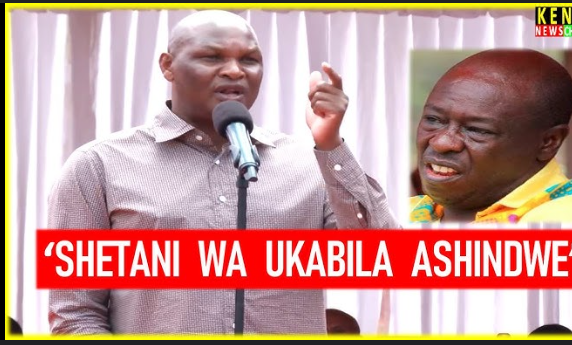Farouk Kibet, a powerful political figure and close aide to President William Ruto, has stirred national attention following his bold remarks against Deputy President Rigathi Gachagua.
During a public address that has since gone viral, Kibet urged Kenyans to ignore Gachagua, describing him as a “tribalist” and “evil.”
His comments have deepened the conversation around growing political tensions and internal wrangles within the Kenya Kwanza coalition.
Kibet did not mince his words as he openly accused Gachagua of promoting dangerous ethnic-based politics. According to him, such behavior threatens the peace and stability of the nation by dividing citizens along tribal lines.
“We must move past leaders who think only in terms of tribe,” Kibet declared. “Kenya is bigger than any single community, and leadership must reflect the unity of all its people.”
The Kenya Kwanza coalition, which brought President Ruto and Deputy President Gachagua into power, has recently faced mounting pressure over issues of inclusivity and representation.
Gachagua has often been criticized for advancing the so-called “shareholding” narrative — a political ideology that implies government benefits should be distributed based on voting patterns and regional loyalty.
Critics argue this approach creates inequality and disenfranchises parts of the population that may not have voted for the ruling party.
Farouk Kibet’s remarks appear to be a clear rejection of this ideology. He stressed that leadership in Kenya should be merit-based and inclusive, not reserved for a few individuals or communities.
“If we are truly building a new Kenya, then every region, every tribe, every citizen must feel part of the government — not just during campaigns, but throughout the journey of governance,” he said.
The strong statement is seen by analysts as a possible reflection of the emerging power struggles within the Kenya Kwanza camp, as various factions prepare for the 2027 general election.
With President Ruto’s camp pushing a broader national agenda, Gachagua’s alleged ethnic leanings are increasingly becoming a point of contention.
Some insiders believe that Kibet’s comments were not random, but rather part of a broader strategy to distance the President from Gachagua’s divisive rhetoric and reassure the public of a more united and inclusive government moving forward.
Reactions to Kibet’s statement have been mixed. While some Kenyans applauded his firm stance against tribalism, others viewed it as an early sign of political betrayal within the ruling team.
On social media, users engaged in heated debates over the future of the alliance, with many calling for accountability from leaders who continue to promote ethnic divisions.
Political observers note that the rift between key Kenya Kwanza leaders could have long-term implications for the coalition’s stability.
As the 2027 polls approach, issues of unity, regional equity, and national cohesion are likely to take center stage.
Kibet’s fiery criticism of Gachagua could signal the beginning of realignments, with new alliances forming as political temperatures rise.
In the meantime, Farouk Kibet’s words have added pressure on Deputy President Gachagua to clarify his stance on national unity and inclusivity.
Whether the Deputy President will respond directly to the criticism remains to be seen, but the debate has already sparked wider national reflection on the kind of leadership Kenyans want moving forward.
Join Gen Z New WhatsApp Channel To Stay Updated On time https://whatsapp.com/channel/0029VaWT5gSGufImU8R0DO30


